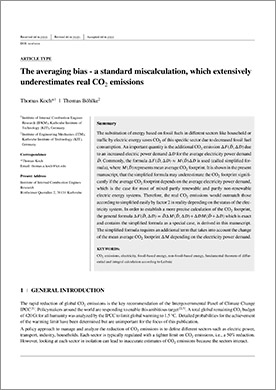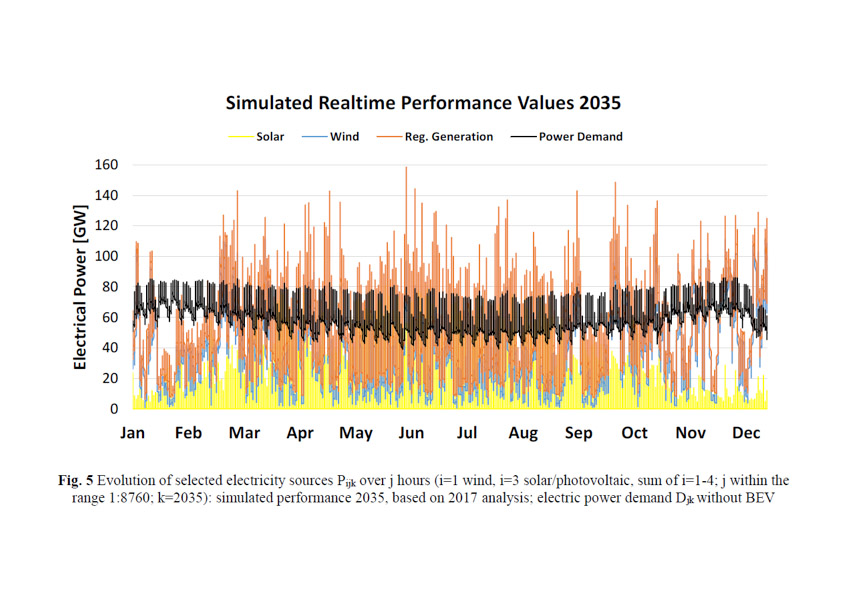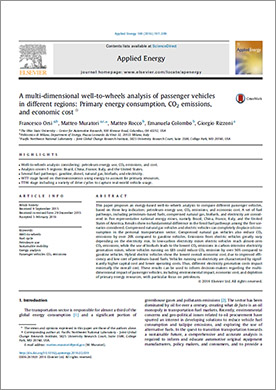List of Publications
Publication 1
„A Data-Driven Greenhouse Gas Emission Rate Analysis for Vehicle Comparisons“
The peer-reviewed publication „A data-driven Grennhousew Gas Emission Rate Analysis for Vehicle Comparisons“ has been published by SAE International, former Society of Automotive Engineers.
The publication analyses the impact of electricity systems on the grennhouse gas emissions of battery electric vehicles. Basically the publication considers the status oft he U.S. grid system. The authors emphasize the marginal cost as a consequence of electricity demand.
The authors emphasize a long term BEV potential but also summarize, that there is limited evidence that immediate widespread adoption of BEVs in the United States will lead to a substantial positive impact on GHG emissions over vehicle lifetime in the near term in comparison to PHEV or FHEV alternatives.
The publication is not available as an open-source document.
Publication 2
„The averaging bias – a standard miscalculation, which extensively underestimates real CO2 emissions”
The peer-reviewed publication „The averaging bias – a standard miscalculation, which extensively underestimates real CO2 emissions” has been accepted for publication in ZAMM – Journal of Applied Mathematics and Mechanics.
The publication demonstrates the mathematics and the impact of the simplified calculus on CO2 emissions of the sector electric energy.
The editor in Chief has kindly accepted to publish this manuscript due to the importance of the calculation. We thank you for this permission.
Publication 3
The remaining CO2-budget – a comparison of CO2 emissions of Diesel and BEV drivetrain technology
The peer-reviewed publication „The remaining CO2-budget – a comparison of CO2 emissions of Diesel and BEV drivetrain technology” has been accepted for publication by Automotive and Engine Technology..
The publication presents the complete elaboration in order to define the CO2 impact of different drivetrain technologies. A comparison of a standard Diesel engine in comparison with a modern BEV is the focus of this publication. Please note, that this publication is not ready for download yet, as it has been recently accepted.
Publication 4
CO2-neutral mobil mit grünem Strom? So reagiert der Stromsektor auf die alternativen Antriebslösungen
The report „CO2-neutral mobil mit grünem Strom? So reagiert der Stromsektor auf die alternativen Antriebslösungen – eine Bewertung energetische und regulatorische CO2-Effekte verschiedener Antriebstechnologien und Energieträger“ is a report by ifW Kiel (Institut für Weltwirtschaft) and frontier economics.
This study has been elaborated for FVV e.V:
This study is currently available in german language and basically focuses on the well-to-tank analysis, the CO2 impact of the electricity sector and the European trading system ETS.
Publication 5
A multi-dimensional well-to-wheels analysis of passenger vehicles in different regions: primary energy consumption, CO2 emissions and economic cost
The publication „a multi-dimensional well-to-wheels analysis of passenger vehicles in different regions: primary energy consumption, CO2 emissions and economic cost” by representatives of Ohio state university, Politecnico di Milano and Northwest National Laboratory focuses on w-t-w impact of different drivetrains.
The CO2 impact of different vehicle drivetrain technologies is analyzed. Additionally the influence of the region and the electricity mix on the w-t-w- energy balance is presented. Different driving cycles were evaluated and finally an economic analysis is presented.
Publication 6
The greenhouse gas emissions of an electrified vehicle combined with renewable fuels: Life cycle assessment and policy implications
The publication “The greenhouse gas emissions of an electrified vehicle combined with renewable fuels: Life cycle assessment and policy implications” demonstrates the impact of different drivetrain technologies on the CO2 emissions.
HEV, PHEV as well as BEV technology are the basis of the analysis. Finally the chances and the potential for electrification is discussed.







